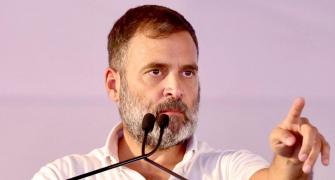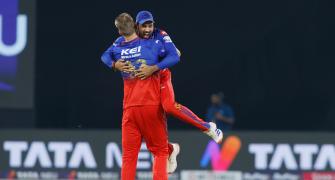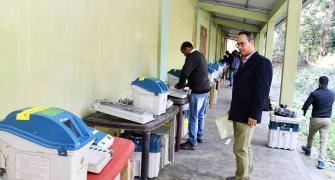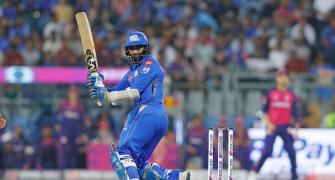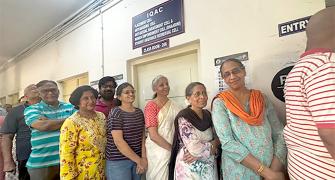January 6 was a cold day in Delhi. A thick fog hung in the air, casting a pall of gloom over the city. But the excitement in Brian Tempest's voice was unmistakable.
The newly appointed joint managing director and CEO designate of Ranbaxy Laboratories, India's largest pharmaceutical company, was calling from Paris after concluding the acquisition of French giant RPG Aventis.
"As of now, we are booking sales on Ranbaxy's name. We are among the top five generic pharmaceutical players in France," he said exultantly.
A few days before, the pharmaceuticals industry grapevine had begun buzzing with the news that at least two Indian companies -- Ranbaxy and Dr Reddy's Laboratories -- were in the race to acquire Heumann, a German generics company owned by Pfizer.
Though both the Indian companies are keeping their cards close to their chest, it is known that Pfizer, the world's largest pharmaceuticals company, has put Heumann on the block and leading generic drug companies from around the world have been making inquiries.
Whether or not an Indian company bags Heumann remains to be seen. But what is certain is that Indian drug companies are prowling for acquisitions in the world's leading pharmaceutical markets.
Thus, Ranbaxy is now looking at acquiring a pharmaceutical brand in the US -- but if the deal is good enough it might just buy the company which owns the targeted brand.
Mumbai-based Sun Pharmaceuticals is also scouting for buyouts in the US. Dr Reddy's wants to set itself up in key European markets like Germany and France, either through alliances or acquisitions.
These acquisitions do not come cheap -- Ranbaxy is reported to have coughed up in excess of Rs 300 crore (Rs 3 billion) to make the French acquisition. So what makes Indian drug makers target pharmaceutical companies abroad?
The answer has everything to do with the new emerging realities in the business.
Come January 1, 2005, India will revert to the regime of product patents.
For three decades India did not recognise product patents and Indian companies thrived by selling clones of patented medicine locally as well as in other unregulated markets at a fraction of the innovator's price. This pipeline will be turned off next year.
At the same time, the sheer cost of developing a new drug -- it can be as high as a billion dollars -- has prevented them from building their own medicine chest. This puts a question mark over their prospects in the Indian market.
This has forced the Indian companies to look at the emerging business opportunity of generic drugs in developed markets.
Starting about ten years ago with Hillary Clinton's campaign for affordable medicine for all, several governments the world over have taken steps to bring down the cost of treatment by encouraging generic medicine.
The French government, for example, has passed a law that a chemist can replace the medicine recommended by a doctor with a generic alternative, if one is available.
The market for generics is all set to explode with estimates suggesting that drugs with sales worth $80 billion will go off-patent over the next few years.
This is the opportunity that several Indian drug companies want to grab with both hands. Three decades of reverse-engineering patented medicine has given them formidable technological skills in the generics space.
The smaller companies are looking at becoming suppliers of generic products to overseas companies. But the giants are going a step further and want to market generic products themselves. This is where overseas acquisitions fit in.
Of course, Indian companies could set up shop in these key markets on their own. But getting regulatory approvals for products takes time.
And the pharma companies often find that drug stores are choc-a-bloc with generic medicines and are unwilling to stock another label. So, the best way to make it to foreign stores is through an acquisition.
An acquisition also brings a trained field force. Alternatively, a company has to spend considerable time and money to set up a field force. Similarly, setting up warehouses too takes time. But if a company makes an acquisition, this problem is also taken care of.
Acquisitions are particularly attractive because any delay can cost millions. There is a score of pharmaceutical companies all over the world eyeing the generic space and naturally there is cutthroat competition amongst them.
However, what has made things easier is that Big Pharma, with a few exceptions like Novartis which has a separate generics arm called Geneva Pharmaceuticals, is gradually losing interest in generic drugs and is willing to vacate the space.
In this situation acquisitions are clearly the best way forward and that's why Ranbaxy targeted RPG (Aventis) in France, though other buys were also available.
The company is ranked fifth in the French generic market with sales of 52 million euros and a market share of over 6 per cent. It has a strong portfolio of 52 molecules with 18 of the top 20 generic drugs sold in the country.
This, in fact, was the third investment that Ranbaxy has made in order to get a foothold in a key market. In 2000, it acquired Basics GmbH, Bayer's generics business in Germany.
In September 2002, it took a 10 per cent stake in Nihon Pharmaceutical Industry, a Japanese generic company. At $50 billion, the Japanese market is second only to the US in size.
With a large and growing population of old people, the Japanese government is trying hard to bring down the cost of medicine.
Ranbaxy hopes that the generic market in Japan will explode in the not too distant future. Hence, it has the option to hike its stake in Nihon when it wants.
Similarly, in July last year, Wockhardt's acquisition of CP Pharmaceuticals Ltd of UK (this was Wockhardt's second acquisition in the UK after Wallis Laboratory at Luton in 1998) at a cost of £10.85 million catapulted the Indian company to the ranks of UK's top 10 generic pharmaceutical companies. (UK is the world's fifth largest pharmaceutical market.)
"Wockhardt has been very successful in its overseas acquisitions. These have of course given us new customers, new markets and new perspectives on international business. But what is more satisfying is the way we have been able to turn them around and put them on the high growth track by leveraging Wockhardt's managerial and technical expertise," says Habil Khorakiwala, Chairman, Wockhardt.
Khorakiwala is almost understating the case. Look at the advantages that the acquisition has brought with it.
Headquartered in Wrexham near Manchester, CP has long-standing established relationships with the UK hospital market and NHS purchasing authorities and major distribution groups. Some of CP's products have significant market share in the UK.
These include natural insulins (hypurin bovine 100 per cent), hypurin porcine (34 per cent), unfractionated heparins (40 per cent), hyalase (100 per cent) and magnapen (57 per cent).
The company has a special manufacturing licence from MCA, which allows it to manufacture patent protected drugs under development. It also has a Home Office licence for the manufacture of Schedule 1 controlled drugs (that's the highest schedule).
Wockhardt couldn't have got a better launchpad. Adds Khorakiwala: "It would have taken Wockhardt many years to achieve such a position in the UK but for this acquisition. With a combined turnover of over £80 million in the UK, Wockhardt now has a critical mass for a push into the larger European Union."
Following this acquisition, 53 per cent of Wockhardt 's turnover will come from abroad.
Dr Reddy's has also moved in the same direction. In its first overseas acquisition, Dr Reddy's acquired UK-based BMS Laboratories and its fully owned subsidiary Meridian Healthcare for £9.05 million in March 2002.
Again, the attraction was the healthy portfolio of generic products. BMS and Meridian have fully integrated manufacturing facilities for oral solids, liquids and packaging located in London and Beverley, UK.
Meridian markets more than 30 generic products through full and short-line wholesalers and has another 70 licenses in the pipeline.
The indications now are that other companies too are poised to leap on the bandwagon.
"The US would be a priority area over the rest of the world. Since the US is the largest and most profitable pharma market in the world, it makes business sense to build a presence in the US. Also once we have products based on our innovation efforts, a presence in the US market will be a must," Dilip Sanghvi, managing director of Sun Pharmaceuticals, says when quizzed on his overseas acquisitions.
The talk doing the rounds is that Sanghvi is about to seal a multi-million dollar deal in the US.
Though he brushes off queries Sanghvi says that the acquisition would be driven by the breadth of the portfolio of the target, its customer coverage in the areas of interest to him and manufacturing ability in defined products.
To be sure, Indian pharma companies have been quick to realise the importance of the US, the world's largest pharmaceuticals market which accounts for almost 50 per cent of global drug sales.
India has 61 manufacturing plants approved by the US FDA, the highest number outside the US. Indian companies have over 50 ANDA filings with FDA, which is approximately 15 per cent of new filings.
Generic sales in the US are estimated at around $13 billion per annum. The message, of course, is: Go West and take your medicine chest with you.
The contrarian
Ajay Piramal, the chairman of Nicholas Piramal India Ltd, is the unchallenged takeover tycoon of the Indian pharmaceutical market.
Nobody has made more acquisitions than him, the latest being his acquisition of Sarabhai's 50 per cent stake in Sarabhai Piramal Pharmaceuticals Pvt Ltd for Rs 69.3 crore (Rs 693 million) which made it a 100 per cent Nicholas Piramal subsidiary. The essence of his business model is to grow through acquisitions.
Yet, Piramal has no plans to make overseas acquisitions. Moreover, he has no plans whatsoever to enter the overseas generics market. "We don't want to fight with our potential partners," Piramal said.
Partners? That's right. Piramal wants to become an ally of overseas pharmaceutical companies, helping them cut production costs by using his expertise and facilities in India.
In fact, a little over a month ago, Piramal announced precisely such a deal with Advanced Medical Optics, Inc., a global leader in ophthalmic surgical devices and eye care products, to supply select components for AMO's eye care products.
More such deals could be coming in the near future. Piramal does not rule out the possibility of such a collaboration even in the field of research & development.
With R&D productivity on the decline, Big Pharma is looking at ways to cut corners. One way out is to outsource some work to low-cost companies.
GlaxoSmithKline, for instance, has signed a pact with Ranbaxy for collaboration in the field of drug discovery and development. This is just the opportunity that Piramal is looking at.
This, however, does not mean Piramal has had his fill of takeovers in the domestic market. After raising his share in the domestic pharmaceutical market from 3.4 per cent to 4.4 per cent with the acquisition of Sarabhai Piramal, he now as his sights trained on the top spot.
(At the moment, Piramal is third in the pecking order after market leader GlaxoSmithKline (GSK) which has a 5.7 per cent share and Ranbaxy with a 4.7 per cent share.) And growth through acquisitions holds the key.
"There is going to be a consolidation in the market with many mid-sized companies will be taken over by the bigger players," he said indicating that he would target companies with a turnover of around Rs 200 crore (Rs 2 billion) for takeover.
Piramal added that he expects the valuation of such companies to fall sharply as the new patent regime comes into force from January 1, 2005.

